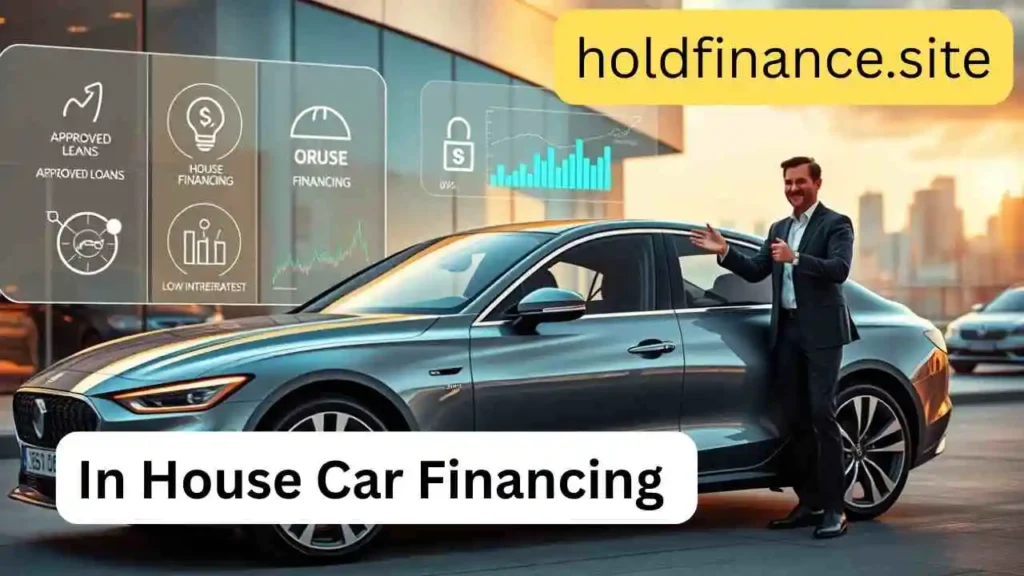Thinking about in-house car financing but not sure if it’s the right move? You’re not alone. Many buyers with less-than-perfect credit consider this route for its fast approvals and flexible terms—but it’s not without risks. In this guide, we’ll walk you through everything you need to know, from red flags to negotiation tips, so you can finance with confidence.
Table of Contents
How to Navigate In House Car Financing Successfully
Introduction to In House Car Financing
Buying a car is already stressful enough, right? Now imagine adding financing into the mix—especially if your credit isn’t exactly spotless. That’s where in house car financing often enters the picture. It’s marketed as a simple, step-in-and-drive type of financing strucutre even if the bank quoted you “no” yesterday, and they’d initially turn you down. But does it really avoir complications overall?
Let’s analyze it.
What does in house financing mean?
In house car financing direct financing refers to a situation where the dealership sells the vehicle and finances the loan without an intermediary bank or lender. This is often refered to “buy here, pay here.”
There, you purchase the vehicle. You make payments there. Straightforward, on the surface.
How It Differs From Traditional Auto Loans
Unlike traditional financing, which involves approval from banks or credit unions, in-house financing happens internally. It’s faster, usually less paperwork, and far more forgiving—at least in the beginning. But there’s a trade-off: the terms are often less favorable.
Why Buyers Consider In House Car Financing
Credit Challenges
Most people turn to in house car financing because of credit problems. Maybe they’ve got a history of missed payments, or they’re fresh out of bankruptcy. Banks don’t love that. Dealers with in-house financing? They might not even blink.
Convenience and Accessibility
You can walk in, pick a car, and get approved—all in the same place. No bouncing between banks, waiting on approvals, or hunting down co-signers.
Faster Approvals
Sometimes, you get an answer in minutes. It offers a sense of relief, especially for applicants with a poor credit history.

The Advantages Of In House Car Financing
Easier Approval Process
That’s the big draw. In house car financing lenders usually care more about your income than your credit score. If you can prove you’re working and can pay, you’re likely good to go.
Build or Rebuild Credit
Some dealers report payments to credit bureaus. So if you’re consistent, this could slowly boost your credit standing.
Flexible Down Payment Options
Not everyone can drop thousands upfront. Some in-house plans allow smaller down payments—or even none at all.
The Cons of In House Car Financing
Higher Interest Rates
This is where things get sticky. You might be looking at 15%, even 20% APRs. That’s significantly higher than a typical bank loan.
Limited Car Selection
You’re usually stuck picking from what the dealer owns outright. That could mean older cars, higher mileage, or less variety.
Potential for Predatory Practices
Unfortunately, not all dealers operate with your best interest in mind. Some rely on complex contracts, high repossession rates, and sneaky terms.
How to Assess an Offer for In House Car Financing
Comprehending the Rules and Situations
Always ask: What’s the APR? What’s the total cost? Are there penalties? If it sounds confusing, that’s a red flag. Get it in writing. Read it twice.
Checking the Total Cost of the Vehicle
A $10,000 car could cost you $18,000 over time if the interest rate is high enough. Do the math—not just the monthly payment.
Comparing with External Loan Offers
Even if your credit is rough, try a few banks or credit unions first. You might be surprised by the offers you get—and then you’ll know how your in-house deal really stacks up.
Red Flags to Watch Out For
No Credit Check at All? Be Cautious
If the dealer doesn’t care about your credit at all, ask yourself: Why? Often, it means they make their money by repossessing and reselling the same car multiple times.
Balloon Payments or Hidden Fees
Some contracts include a massive payment at the end—or extra charges buried in the fine print. Always ask for a full payment schedule.
Dealers That Don’t Report to Credit Bureaus
If you’re hoping to build credit, but the dealer doesn’t report your payments… well, that’s a missed opportunity.
Preparing Before You Step Into the Dealership
Know Your Credit Score (Even if It’s Low)
Understanding where you stand helps you negotiate better. You’re not just guessing what they might offer—you’re coming in informed.
Set a Realistic Budget
Figure out what you can afford monthly—including insurance, fuel, maintenance, and surprises.
Research Vehicle Values and Fair Prices
If you know the car’s worth before the dealer names a price, you’re already ahead of the game.
Questions to Ask the Dealer
- Is the loan serviced in house car financing the entire time?
- What’s the APR and loan term?
- Can I pay it off early without a penalty?
- Is there a warranty?
- Are you reporting payments to the credit bureaus?
These aren’t “extra” questions—they’re essential.
Negotiating a Better Deal
Don’t Accept the First Offer
It might feel like you don’t have options, especially with bad credit—but you do. Ask for better terms.
Use External Offers as Leverage
Even a high-interest bank offer gives you something to compare with. It shows the dealer you’re not desperate.
Focus on the Total Cost, Not Just the Monthly Payment
A $200/month payment might look sweet… until you realize you’re paying for 72 months at 19% interest. Ouch.
Understanding Repossession Risks
What Triggers a Repossession?
Missed payments, usually—but sometimes, just being late once or twice can start the process. Read your contract carefully.
Grace Periods and Communication with the Dealer
Some dealers offer a short grace period, others don’t. The key? Stay in touch. Don’t ghost them if you’re struggling.
How It Affects Your Credit
Repossession hurts. And even if the dealer didn’t report your good payments, they will report your default.

Making Timely Payments and Building Credit
Setting Up Automatic Payments
If the dealer offers it, auto-pay can help you stay consistent. One less thing to think about.
Monitoring Your Credit Reports
Use free tools or check with your bank. Keep an eye on whether your payments are being reported.
What to Do If You Fall Behind
Speak with the seller. It’s strange, to be sure, but better than pretending it’s not incorrect. They could provide a strategy.
Alternatives to In House Car Financing
Credit Union Auto Loans
Even for people with terrible credit, they typically have lower rates and are more accommodating.
Online Lenders and Bad Credit Loan Programs
There are plenty of online services now that cater to lower-credit borrowers with fairer terms.
Lease-to-Own Options
This might be worth looking into if you’re struggling to get a decent loan and still need reliable transportation.
Real Stories: The Good and The Bad
A Success Story of Credit Rebuilding
One buyer shared how they got approved for a small, older car through in house car financing. Within a year of making every payment on time, their credit score jumped 80 points. Later, they refinanced.
A Cautionary Tale of Hidden Terms
Another buyer didn’t realize they signed a balloon payment deal. They returned the car when they couldn’t make the final $3,000 lump sum. Read your contract.
Is In House Car Financing Right for You?
Who It Helps Most
If your credit is damaged but you’re working steadily and can handle a higher interest rate temporarily, it can be a bridge—not a forever solution.
When to Walk Away
If the terms seem predatory or the dealer can’t answer your questions clearly… walk. Actually, run.
FAQs
1. Is in house car financing bad for my credit?
Not necessarily. If the dealer reports your payments, it can help improve your credit—just make sure they do.
2. Can I refinance my in-house car loan later?
Yes, if your credit improves, refinancing could save you money. Start checking around six months in.
3. Do in-house dealers check credit at all?
Some do, some don’t. It varies. If they don’t, be extra cautious about the loan terms.
4. Is it better to save for a down payment or go with low/no down offers?
If possible, save. A bigger down payment lowers what you owe and sometimes gets you better terms.
5. Will I own the car outright once I finish paying?
Yes—unless it’s a lease or balloon deal. Always confirm you’re buying, not renting.
Conclusion
In-house car financing can be a helpful stepping stone—but it’s also a potential minefield if you don’t tread carefully. The best advice? Don’t rush. Do your homework. Ask questions that might feel uncomfortable. And above all, make sure the deal you’re walking into doesn’t become a regret down the road.
Read More:
The Future of Bobcat Financing: Trends to Watch
How to Improve Kia Finance? My Chances for Approval